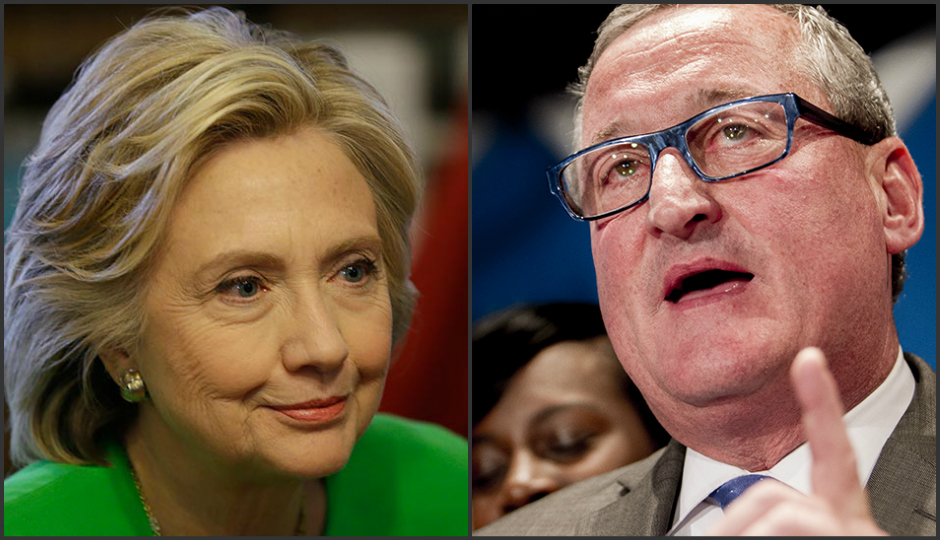What Kenney’s Endorsement of Hillary Clinton Says About Him

Left: Associated Press. Right: Jeff Fusco.
Apparently Mayor Jim Kenney wasn’t feeling the Bern.
Kenney this morning announced that he is endorsing Hillary Clinton in her Democratic primary battle with Bernie Sanders. “Hillary Clinton has the heart, strength and depth of knowledge and experience to unite our nation and lead us during these troubled times,” he said in a news release. “She will build on the accomplishments of President Obama and continue the economic growth and expansion he successfully initiated.”
It might seem a bit of an odd choice for Kenney, who swept into office less than two months ago in a haze of comparisons to — and even an endorsement from — New York City Mayor Bill de Blasio, a lefty politician seen as a class warrior in the Sanders mode. But there’s also nothing new here: Since he began running for mayor last year, observers have wondered about the tensions between “Old Kenney” — longtime South Philly pol — and “New Kenney” — progressive hero to bicycle-lane-loving millennials.
The Clinton endorsement suggests those questions won’t go away soon.
Kenney’s recent history on the City Council, as a passionate defender of LGBTQ rights and the foremost advocate for the city’s marijuana decriminalization efforts, sometimes seemed to put him to the left of his predecessor, Michael Nutter — who, not incidentally, has also endorsed Hillary Clinton. (Kenney’s spokeswoman, Lauren Hitt, even worked for de Blasio previously.)
Temperamentally, too, Kenney has often seemed to enjoy giving an elbow to (certain) establishment figures.
But support for LGBTQ rights and pot isn’t exactly outside the Democratic mainstream these days, even if Hillary Clinton might be slow to pick up the latter mantle. And Kenney’s signature big effort — to create universal pre-K for Philadelphia citizens — may seem like a giant new social program, but it too is a fairly mainstream idea: Clinton has embraced it as part of her own platform.
What’s more, Kenney has sent signals that he won’t be boxed in with his party’s progressives.
In December, for example, the Associated Press reported that Kenney had “bristled” at being labeled “progressive” in an interview about his goals in City Hall.
“How about fairness?” he said in response to the label. “When you know something’s unfair, it’s unfair. There are certain things that you have to acknowledge are the case and then work to fix them.”
More concretely, Kenney has also seemed to steer back to the middle on at least one policy decision — he recently walked back his campaign promise to end the practice of “stop-and-frisk” by city police.
Does this mean that Kenney, far from being radical, is actually a standard-issue Democrat? That would suggest his anti-Nutter bearing might be as much about style as it is about anything substantive. And that, in turn, could have practical consequences, raising questions about whether the broad coalition that supported his mayoral run — one that seemingly transcended Philly’s old-school racial politics — will stick with him.
Remember, though: Before Kenney was known as — and rejecting the label of — “progressive,” he was seen as an old-school Fumo Democrat who even once called his own record, way back in the 1990s, “moderate-conservative.”
Not exactly the track record of a Bernie Sanders endorser. Then again, de Blasio, too, has endorsed Hillary Clinton for president.